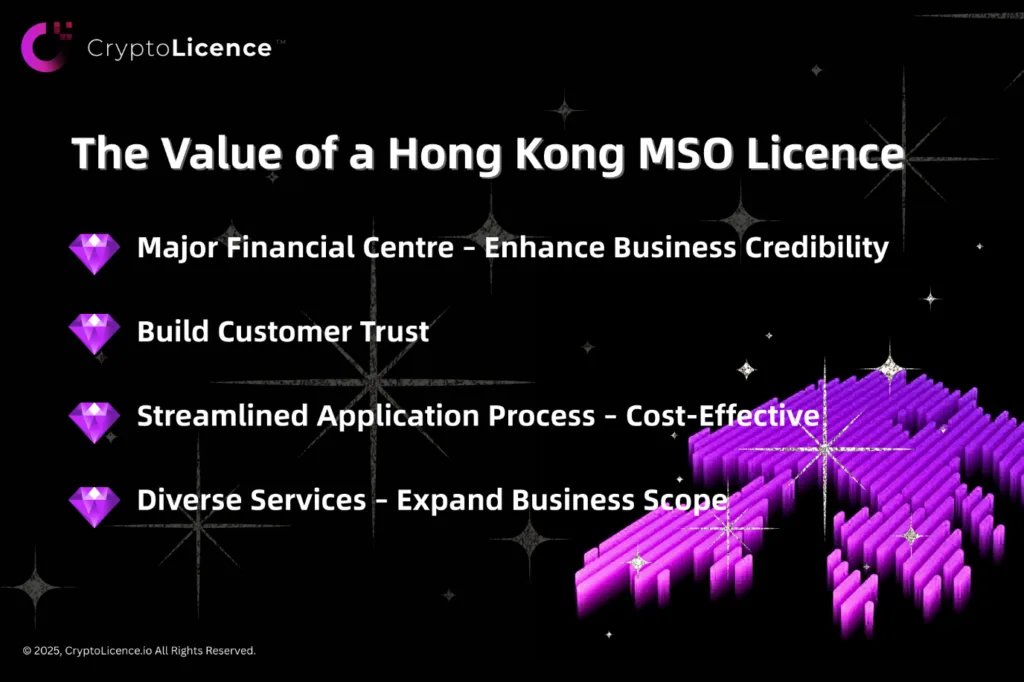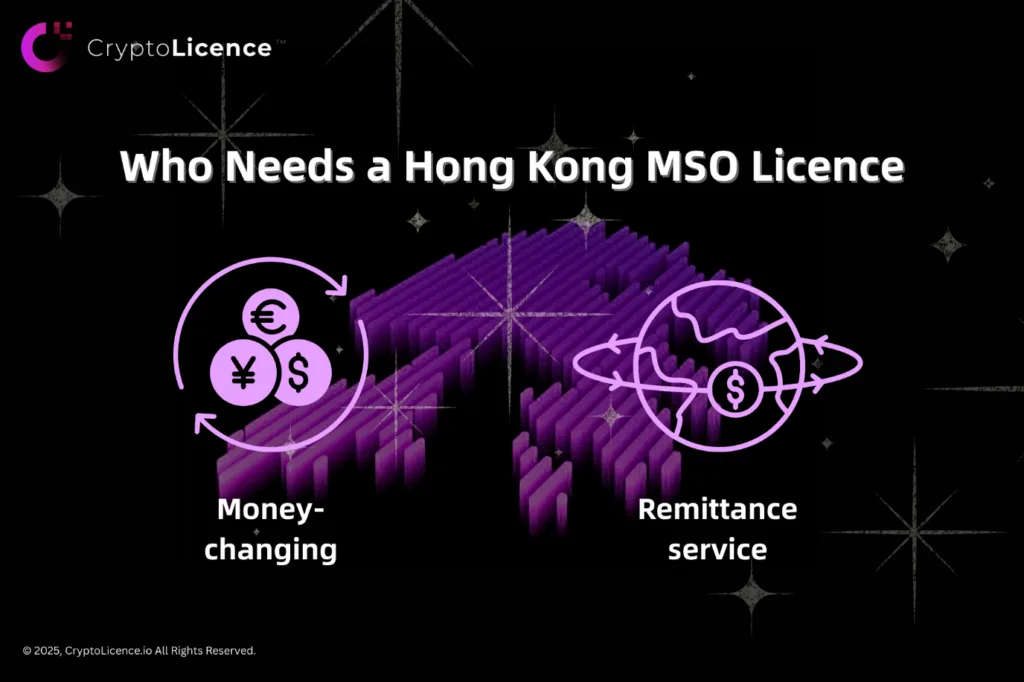
Hong Kong MSO Licence Approvals Plummet—How Can You Clear the Higher Compliance Bar?
The Hong Kong MSO (Money Service Operator) licence is the golden key to the city’s financial market. It grants firms the authority to conduct currency-exchange and remittance business legally, carrying weight and recognition worldwide. This article explains how an MSO licence can boost your credibility in Asia’s premier financial hub, win customer trust, and unlock multiple revenue streams. It also breaks down the eligibility criteria, application process, and practical tips for coping with tighter supervision. Whether you are a cross-border e-commerce operator, a fintech pioneer, or a virtual-asset trader, mastering the value of an MSO licence will help you secure your place in Hong Kong’s thriving financial arena.
Table of Contents
The Value of a Hong Kong MSO Licence
The Hong Kong MSO licence, often called the “Money-Service Provider licence”, is the passport that lets a business legally conduct currency-exchange and remittance activities in Hong Kong; its credibility is widely respected across global financial markets.

1. Major financial hub, boost your corporate credibility
As Asia’s most vibrant financial hub and the world’s top offshore-renminbi centre, Hong Kong enjoys unique advantages. Its free-port status allows funds to flow freely without exchange-control limits, making it a safe haven for global capital. About 70 % of global offshore-CNH trading volume occurs here, giving Hong Kong unmatched market depth. A mature regulatory framework, transparent public markets, and a wide array of financial products further cement its position. Holding an MSO licence therefore markedly enhances a firm’s legitimacy and competitiveness on the world stage. With cross-border FX and remittance needs surging, an MSO licence is increasingly critical to grabbing first-mover advantage and creating greater commercial value.
2. Greater customer confidence and compliance protection
Every MSO transaction is overseen by Hong Kong Customs and Excise Department (C&ED), ensuring full compliance and secure, confidential fund flows—dramatically raising client trust.
3. Streamlined process and cost efficiency
Compared with other centres, Hong Kong offers a direct, transparent application route, moderate supervisory burden, and competitive licence fees, making overall costs more predictable.
4. Diverse services and broader scope
Licence holders may provide currency exchange, remittance, and FX dealing, meeting the varied needs of cross-border e-commerce, fintech, and virtual-asset sectors.
Who Needs an MSO Licence?

Any individual or entity that provides currency-exchange or remittance services in Hong Kong must apply to the Commissioner of Customs and Excise for an MSO licence. The requirement covers the following scenarios:
1. Money-Changing Service
Operating a currency-exchange business in Hong Kong (excluding incidental services linked to a principal business). For example, the following are not treated as a standalone money-changing service:
• A retailer that merely takes foreign cash during a sale; or
• A hotel operator who, on the hotel premises and mainly for the convenience of guests, buys foreign currency only by paying out Hong Kong dollars.
2. Remittance Service
Carrying on, as a business in Hong Kong, any of the following:
- Sending, or arranging to send, money out of Hong Kong;
- Receiving, or arranging to receive, money from outside Hong Kong;
- Arranging for money to be received outside Hong Kong.
The MSO licence is valid for two years. To keep operating a money-service business, you must apply for renewal from 90 days before the licence expires up to 45 days after expiry.
Financial institutions already supervised by the Securities and Futures Commission (SFC) or the Hong Kong Monetary Authority (HKMA)—such as authorised banks, licensed corporations, and authorised insurers—do not need an MSO licence.
Key Application Requirements
The following strict requirements need to be met for MSO application:
1. Company requirement – A Hong Kong-incorporated limited or unlimited company, or a registered branch of an overseas company. MSO license holder may be residents or non-residents, and shareholders may be individuals or corporates.
2. Paid-up capital – The company must have a minimum paid-up capital of HKD 500,000, with a legitimate and traceable source of funds.
3. Fit-and-proper test – At least one director, along with all shareholders and ultimate beneficial owners (UBOs), must pass a fit-and-proper assessment conducted by the Hong Kong Customs and Excise Department (C&ED).
Applicants are required to submit a police clearance certificate (criminal record check), recent bank statements, and a fit-and-proper person declaration form, which must be signed in the presence of an authorised witness (such as a C&ED officer, practicing lawyer, accountant, auditor, or notary public).neligibility: Any individual or entity that has a criminal record, is bankrupt and not yet discharged, or is managed by such individuals, will not qualify.
4. Business premises – A real office in Hong Kong, evidenced by a stamped tenancy agreement and approved by C&ED. A residential address may be accepted with written consent from all occupants plus title or lease documents. If there is no dedicated premises, a Local Management Office may be appointed for record-keeping and is subject to on-site inspection.
5. Documentation – Applicants must submit:
- Business Registration Certificate, Articles of Association, personal particulars of all directors, shareholders, partners, and UBOs
- Detailed business plan covering services, target markets, and risk controls
- AML and IT policies, plus board/partner authorisations
6. Interview and capability assessment – Applicants must demonstrate operational readiness and compliance capability to C&ED. This includes a beta version demo of the company’s website or app, showcasing how the platform supports money-changing, remittance, and related services in a manner compliant with AML and KYC requirements. C&ED will assess the system’s stability and compliance measure.
In addition, the applicant must attend a face-to-face interview, where C&ED will verify the authenticity of submitted materials, assess the feasibility of the business plan, evaluate the professionalism of the management team, and test the applicant’s understanding of regulatory obligations.
Final approval depends on both the interview performance and system demonstration.
Rising Application Difficulty
1. Business model matters
Low-value, over-the-counter cash exchange has modest risk and faces fewer hurdles. Online models—especially high-frequency, high-value funds flows (cross-border payments or virtual-asset transactions)—must evidence strong AML controls, making approval far tougher. Banks classify money-service businesses as high-risk for laundering, so opening accounts is challenging without prior banking pedigree.
2. Tougher supervision
Demand for licences has surged among cross-border e-commerce, fintech, and virtual-asset firms. To align with global AML norms under the Anti-Money Laundering and Counter-Terrorist Financing Ordinance (Cap. 615), C&ED has tightened standards, creating a “one-licence-hard-to-get” climate. Since 2023, applications soared while success rates fell; as of May 2025, only about 1,100 firms hold valid licences.
Specific pain points:
- Higher rejection rate – zero tolerance for non-compliance. Common reasons: incomplete documents, vague business plans. Background checks seek to stop speculators who plan to flip licences or lack three-year funding to operate.
- More documentation – business plans, AML/KYC frameworks, financials, shareholder profiles—more types, greater complexity.
- Rising compliance costs – external consultants, monitoring systems, staff training, especially heavy for SMEs.
The Optimal Path to an MSO Licence
Given the high bar and complex process, engaging a specialist team is vital. CryptoLicence offers an end-to-end solution. With years of proven success, we understand every nuance of C&ED procedures and ensure full compliance with the AMLO. Our services cover company incorporation, meticulous document preparation, bespoke AML/KYC policies, transaction-monitoring systems, legal advice, office setup, and ongoing compliance, minimising errors and maximising approval odds.
We provide transparent cost estimates (consultancy, legal, and supplementary documents) to help you budget accurately. By streamlining each stage, we can secure your MSO licence within 7–9 months, giving you a head start in the market.